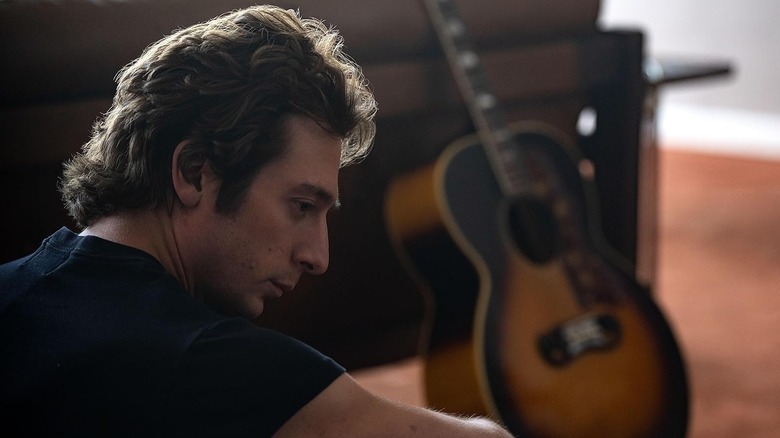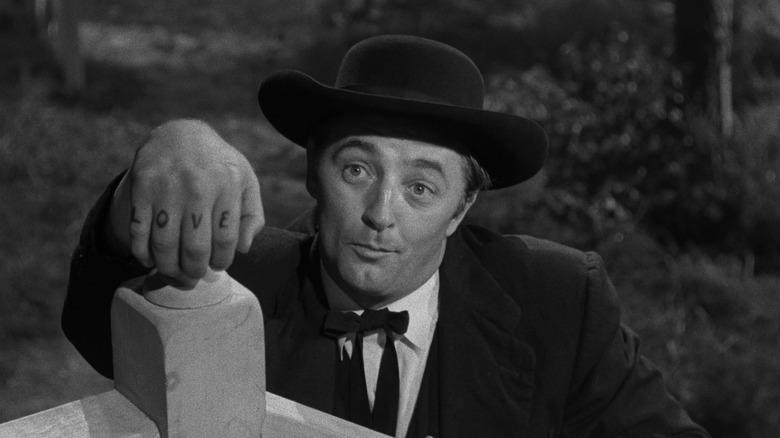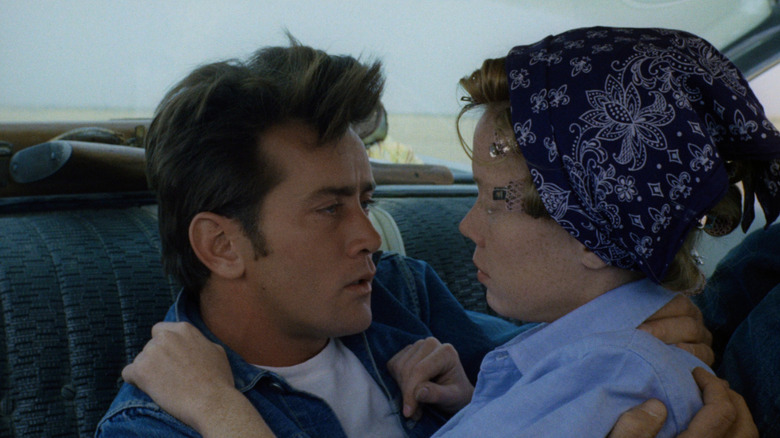The Movies That Inspired Bruce Springsteen In Deliver Me From Nowhere Are True Classics
The question of where artists get their ideas from is a time-honored one, and it's almost as ubiquitous as the answers are mysterious. Most artists don't have a succinct answer to the query, and that's understandable, as everyone's ideas tend to spawn from their own personal tastes, life experiences, and so on. Yet, what's perhaps not talked about that often is how frequently artists are inspired by other art, especially within different mediums. Paintings can inspire books, novels can inspire films, movies can inspire music, and so on.
The latter example is exactly the case with Bruce Springsteen's 1982 album "Nebraska," and it's something that filmmaker Scott Cooper makes sure to dramatize in his film "Springsteen: Deliver Me From Nowhere." It's a movie about The Boss's struggle with depression and his traumatic past during the making of "Nebraska," detailing how the very making of the album is what allows Bruce (played by Jeremy Allen White) to come to terms with these feelings within himself. As part of this process, Cooper shows how movies helped inspire Springsteen to find and hone in on these inner feelings, and the director uses two examples in particular: Terrence Malick's "Badlands" and Charles Laughton's "The Night of the Hunter." The former film is what sets Springsteen on the path to "Nebraska," while the latter represents Bruce's complicated relationship with his father, Douglas (Stephen Graham). It just so happens that both films are certified American classics, movies which are themselves about troubled men. As such, they not only inform Springsteen as a person but also as a character, and thus they influence "Deliver Me From Nowhere" as a film itself.
Robert Mitchum in The Night of the Hunter provided Springsteen with a skewed look at American values
In "Deliver Me From Nowhere," Cooper shows us flashbacks shot in black and white of Springsteen's childhood, where the young Bruce (Matthew Anthony Pellicano) is alternately abused and confused by his alcoholic father. One particular day, when Douglas is sober, he insists that Bruce skip school and come with him to the local movie theater, where "The Night of the Hunter" is playing. Through this flashback, Cooper examines how this viewing of the film riled up a number of conflicting thoughts and emotions within the young Springsteen. Was Douglas' insistence on taking Bruce to this movie some kind of confession or implicit apology for his violence? Or is Douglas unaware of the inference that can be made between himself and Robert Mitchum's character of "Preacher" Harry Powell?
Although "Night of the Hunter" wasn't a direct influence on "Nebraska" per se, the film and Mitchum's performance was a watershed moment for Springsteen in general, hence Cooper including it in the movie. The iconic scene where Powell explains his hand tattoos — one set of knuckles has "LOVE" inked on them, while the other has "HATE" — clearly made a lifelong impression on the musician, as it gets referenced in the lyrics of the song "Cautious Man" from Springsteen's 1987 album "Tunnel of Love." As far as "Hunter" refers to "Nebraska" and Springsteen's mental state while making that album, it's likely that Laughton's Southern Gothic tone is part of the inspiration for the quality that Springsteen so desperately wants to capture aurally. The way "Night of the Hunter" skews traditional American values — masculinity, religion, and genteel society — no doubt also acted as fuel for Springsteen's songs.
The lyricism of Badlands allowed Springsteen to get more personal
Even more important to Springsteen and "Nebraska" is "Badlands," which "Deliver Me From Nowhere" devotes an entire sequence to. After Springsteen happens upon a television airing of Malick's movie in the film, he begins watching it on repeat while visiting the local library in Colts Neck, New Jersey, and researching reviews and articles about it. Through those, he learns that real-life Nebraskan spree killers Charles Starkweather and Caril Ann Fugate acted as inspiration for the fictional Kit (Martin Sheen) and Holly (Sissy Spacek) in Malick's film. Springsteen then writes a song about the real-life killers originally called "Starkweather" before retitling it "Nebraska" and changing the third-person lyrics to first-person. Cooper's movie implies this change (making the lyrics more personal instead of giving them distance) represents the moment where Springsteen begins investigating his own inner troubles rather than running away from them.
It's fitting that "Badlands" acts as the impetus for "Nebraska" and "Deliver Me From Nowhere" itself. It not only continues the American Gothic theme that infuses both the album and the film, but it's also a perfect mixture of idyllic heartland lyricism with something rotten and sinister beneath. For Springsteen, it represents his childhood and connection to his roots, something he holds a lot of nostalgia for and pride in, although the toxicity of his abuse cannot be repressed or denied.
There's an old adage that's been attributed to Pablo Picasso: "Lesser artists borrow; great artists steal." One of its meanings involves the way that great artists are inspired by great art. "Deliver Me From Nowhere" demonstrates that with these two classic films, so hopefully cinephiles and musicphiles will find themselves similarly inspired by the movies and Springsteen's songs.
"Springsteen: Deliver Me From Nowhere" is now playing in theaters.


